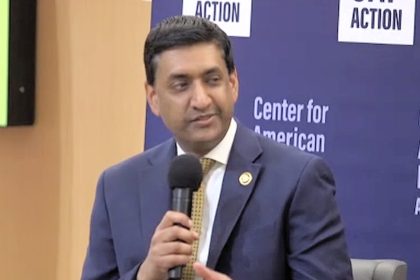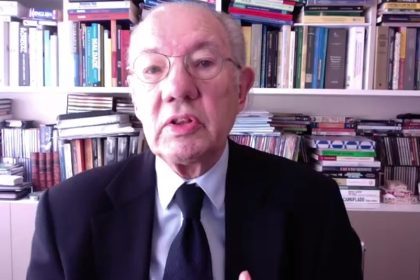Critics Say Humanitarian Aid May Prolong Conflict, Hamper Long-Term Development

WASHINGTON — According to the United Nations High Commissioner for Refugees, at the end of 2020 the most people on record — about 82.4 million people — were displaced around the world and 243.8 million people required humanitarian assistance. That is one in 33 people worldwide needing help from the U.N. and partner organizations.
As these numbers attest, over the last 20 years, the humanitarian aid sector has undergone tremendous growth in activities and funding to respond to increasingly significant needs. But while at its heart humanitarian aid is altruistic, some inside the industry believe aid money could actually do more harm than good. Left unchecked, it could even be prolonging conflict around the world.
“As important and noble as it is at its core, [humanitarian aid] comes with pitfalls, challenges and blind spots,” Merissa Khurma of the Wilson Center admitted at a discussion the think tank recently hosted.
Aid itself has become a multibillion-dollar industry. This industry is subject to politicization in both the donor and beneficiary countries, it could exacerbate local discontent, and sometimes it funnels resources to adversarial groups or disincentivizes political leaders from reaching a resolution. And while bad practices, often revealed after major crises, have often led the industry to consider reforms, the problem is that it isn’t necessarily in the system’s best interest to actually make a change.
“[What] once was a small collection of lightly organized groups has seen staggering expansion,” Jessica Alexander, policy editor at The New Humanitarian said. She explained that this growth has compelled the sector to become more professionalized and bureaucratized, which has led to a loss of nimbleness and adaptability.
It has also made humanitarian relief into a market competitive for private and government assistance dollars.
“I had a front row seat for the evolution of USAID,” former USAID Chief of Staff William Steiger said. “It’s an oligopoly.”
While the perception may be that USAID responds quickly in the aftermath of an emergency by getting money out the door, Steiger confirmed this process takes much longer, with the agency actually promising to reimburse other smaller agencies that can take on the work and spend their own money in anticipation of being repaid. This encourages the use of a small number of preapproved organizations that can take on the risk and work within USAID’s rigid assessment process.
Because of this, USAID’s distribution of humanitarian aid is essentially a closed market composed of a small number of U.N. agencies and NGOs that makes it difficult for new entrants to break in. That, coupled with an aversion among donors to risk untested approaches, makes it hard to realize efficiencies or effect systemic change.
Asher Orkaby, research scholar at Princeton University’s Institute for Transregional Study, argued that “the model of internationally driven humanitarian aid is inherently flawed” for other reasons.
“Increasing amounts of unchecked foreign aid has created unhealthy donor dependency,” he said, as well as fuel for political patronage and a disincentive to resolve the conflict causing the crisis.
“[Foreign aid works are] short-term solutions hampering long-term development prospects,” Orkaby insisted.
Simply by changing some practices, Steiger said USAID could help reform some inefficiencies and disaccords. His suggestions included coordinating with other countries’ aid agencies to avoid duplicative efforts, broadening the network of organizations to which USAID could award dollars, as well as making “smaller awards with less strings attached.”
Changes like those Steiger suggested may help to avoid loaded and expensive bureaucracies and instead localize humanitarian aid with local development associations, he said. Though challenges exist with using locally led initiatives as well.
Locally led initiatives can shoulder a burden of risk on nationals as well as possibly funneling resources to adversarial groups. There would be increased funding competition on the local level, where there is an inherent danger of humanitarian aid becoming political patronage, as well as potential for theft and resource diversion with regimes that are skillful at manipulating foreign aid in their favor.
“We are naïve to believe there is not a political aspect to humanitarian aid. There is no such thing as completely impartial foreign aid,” Steiger said. “In every situation politics has to be considered.”
And while aid has been praised for raising the living standards of some communities in need, critics like Orkaby contend that it also exacerbates the risk of donor dependency, which can actually impede the growth of local markets and keep them constrained.
“Food aid has brought Yemeni farmers into a ruinous cycle of poverty,” explained Orkaby. “Farmers cannot compete with free or subsidized food and then have no profits to invest during cropping season.”
“And donor dependency is something that has occurred not just in Yemen but throughout the conflicts … where short-term solutions are really hampering long-term developmental prospects. It’s creating a cycle that one can hardly break out of,” he insisted.
“A well-thought strategy could eliminate many of the needs for humanitarian aid,” admitted Orkaby.
Among the suggestions broached during the Wilson Center’s discussion were efforts to encourage the private sector to play a more important role in humanitarian efforts, promoting the use of direct cash assistance to communities in need, and centering attention on beneficiaries in lieu of organizations to enhance impartiality and neutrality in conflict zones.
Kate can be reached at [email protected]























